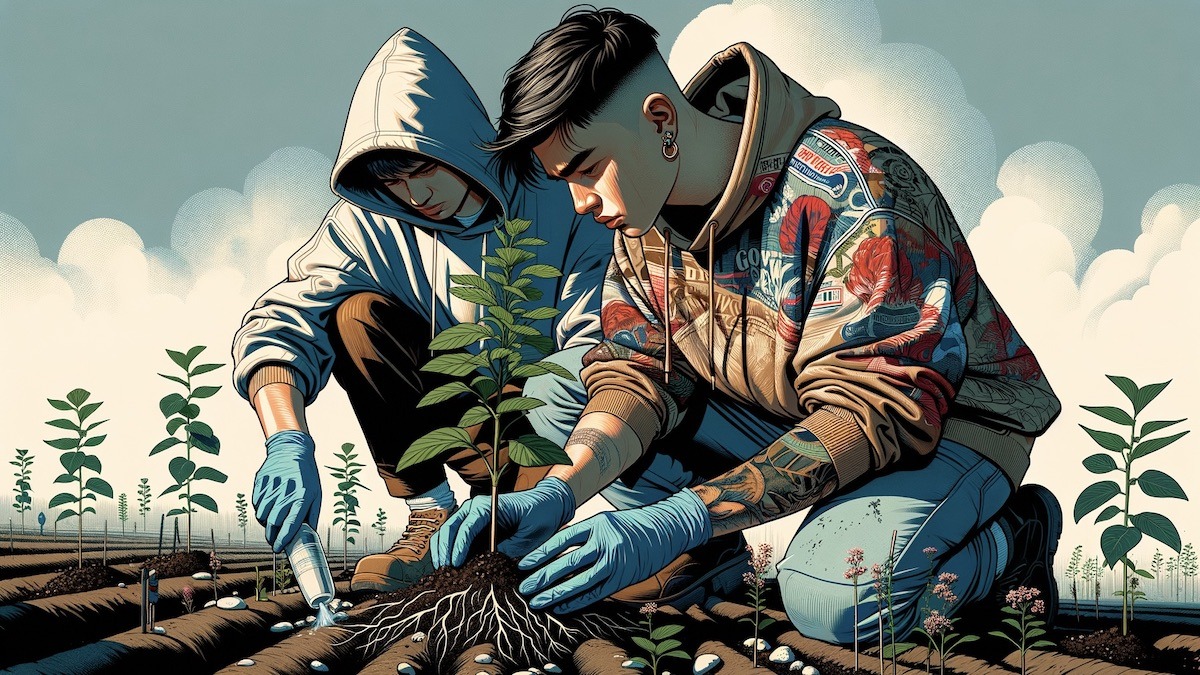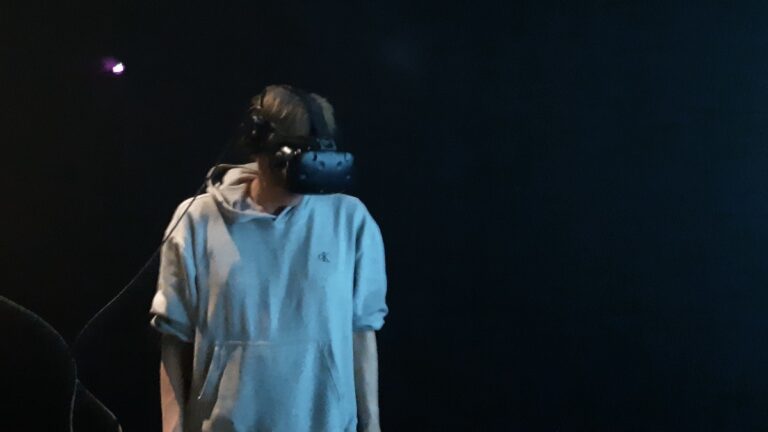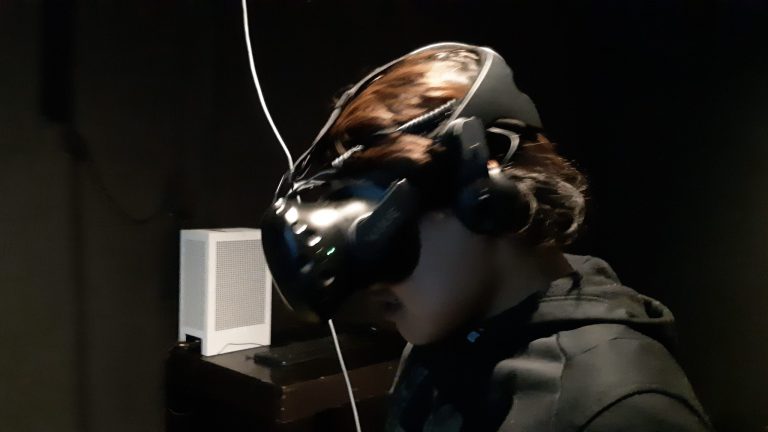
Bridging Tradition and Technology with Northern, Rural and Indigenous Communities
Team members met on June 9, 2025 for our weekly Monday Mornings with MCAD session. This week saw us diving deep into the intersection of AI adoption and climate entrepreneurship. Krish delivered a great presentation on AI and noted that it’s clear AI is rapidly changing how people work and learn, much like the printing press transformed society centuries ago. He noted that while many AI projects in the North are linked to larger institutions, there’s a growing buzz among youth who are already using AI for everything from homework to image generation.
This widespread, informal adoption highlights AI’s potential as a “lifesaver” for smaller communities with limited resources, enabling decentralized collaboration and creating “hubs and clusters” of specialized work. We discussed how AI could help communities work together, emphasizing a “community of care and practice” approach, which aligns with mutual aid principles.

Culture, Language and Literacy
Cultural preservation is often at the heart of our work. Traditional knowledge in the North is typically passed down orally and through hands-on experience with Elders. We heard about exciting projects using AI to support traditional plant identification and to preserve vital cultural expressions like traditional drum dance songs, or pisiit/pihiit. These songs are essentially life stories, and with Elders who hold this knowledge passing on, AI offers a new opportunities to support preserving these oral traditions.
A significant part of our conversation revolved around language and literacy. We explored how AI tools can bridge literacy and language gaps by simplifying complex information, making knowledge more accessible. Unlike the individualistic learning styles often seen in Western and Southern cultures, Northern communities thrive on group learning and peer-to-peer discussions. This led us to consider how AI systems could be designed to support group interactions, rather than just one-on-one use, to better fit these collective cultural practices. We also talked about how advancements in Inuktitut translation capabilities, like Microsoft Translator’s new text-to-speech feature, are truly encouraging for language preservation efforts.
We talked about how our projects build on the legacy of programs like the Arviat Film Society model, where youth interviewed Elders, as a way of supporting intergenerational knowledge transfer. One of our goals this year is to design culturally sensitive AI systems that are owner-engaged, reflect community input, communicate in multiple modes, and prioritize relationships over mere utility.
Northern Climate Entrepreneurship
We also tackled the critical topic of Northern climate entrepreneurship. Some of the main hurdles for launching micro-businesses—whether in art, food, or land-based ventures—are often related to administrative tasks like business planning, paperwork, navigating funding applications, reporting, communications, and marketing. Navigating these processes can be overwhelming, especially for those not fluent in English.
We emphasized the importance of integrating cultural protocols and local values, like Inuit Qaujimajatuqangit, into business guidance.
While past efforts to teach coding a few years ago often faced significant barriers like limited infrastructure and bandwidth, the landscape has dramatically changed. Thanks to systems like Starlink and the pandemic-driven shift to videoconferencing, connectivity has improved. More youth are more digitally literate, and AI is quickly becoming a game-changer for coding and website development. These technologies allow users to focus on creative modifications rather than deep technical knowledge. This means that if we were to repeat earlier coding initiatives, the approach would be entirely different, leveraging AI to streamline tasks that once took weeks.
AI Powered Storytelling
Looking ahead, we discussed how AI-powered storytelling and knowledge preservation can build on the impacts and outcomes of past projects, many of which were driven by Elders concerned about community well-being. Jamie talked about the success of past projects, like the Nanisiniq Arviat History Project, which aimed to strengthen identity through media arts and to incubate entrepreneurial opportunities for youth. A decade later, AI is being seen as a powerful collaborator for this kind of work, for example helping to upgrade existing databases and deepen engagement with digitized traditional knowledge. We also explored the concept of “inherent use and adoption” of technology, acknowledging that much of our learning has been self-taught. The rapid evolution of AI means we’re constantly asking, “What can we do with it?” and “How can we use these tools?”
Finally, we started discussing the complexities of honoring Indigenous protocols within the context of AI. It’s a challenge, particularly since much of the existing research often comes from privileged academic circles and how we need more grassroots voices. We emphasized that the focus should be on how users apply traditional values to AI, rather than expecting AI to inherently reflect them. Krish noted that community is unique, requiring a hyper-local focus to integrate values effectively. Our homework this week is to review a book on Indigenous entrepreneurship from Toronto Metropolitan University.
Olaf introduced us to experimenting with custom GPTs, like the “Climate ECO-STAR builder,” to understand how prompt engineering can tailor AI for specific languages and reading levels. Our reflections on past projects confirmed that AI wasn’t even on the radar a decade ago, highlighting just how quickly the technological landscape is shifting and underscoring the need for adaptable strategies moving forward.
Our next meeting will be on Monday, June 16, 2025.
In Other News
Youth AI releases Online Volunteer Management Tool
Art Borups Corners released a new tool for helping schedule and sign up volunteers for managing community waste transfer stations. This cool new WordPress plugin provides a comprehensive solution for both administrators and community members, helping to bridge the gap between volunteer needs and availability.
Managing community initiatives, especially those requiring regular volunteer participation, can often be a logistical challenge. For communities, like many Local Services Boards in Northwestern Ontario running weekly waste management stations, ensuring consistent volunteer coverage can be challenging. That’s why we’re excited to introduce the Waste Station Volunteer Manager, a new WordPress plugin designed to simplify and streamline the entire process of recruiting, scheduling, and managing volunteers for weekly waste drop-off stations.

Melgund Township Pavilion Construction Underway
June is Parks and Recreation Month in Canada. Work is ongoing at the Dyment Recreation Complex, where a new pavilion is being set up next to the Cookshack. The cement was poured this week, and it’s currently setting. The community expects to see this wonderful outdoor space, perfect for group meetings, outdoor performances and community feasts, completed for the Canada Day Celebrations that will take place on July 1st. Thanks to the Nuclear Waste Management Organization (NWMO) for funding construction of this wonderful new community space with a $50,000 contribution to the community.
Art Borups Corners June Artist Retreat on June 13
Artists and musicians from Dryden, Borups Corners and Dyment will be gathering with Art Borups Corners this weekend for their first Summer Artists Retreat. There will be plenty of planning, group discussions and especially practices and repertoire development for the big event on Canada Day. All who are able to join us are most welcome. Also, on June 20th, there will be an Open Mic night at the Dryden Go-Getters Senior’s Centre that will also have a barbecue!
Local Services Board of Melgund Community Meeting
The Local Services Board of Melgund will hold its monthly community meeting on Tuesday, June 17. All residents and interested persons are welcome to attend.
Indigenous Business Roundtable with BizforClimate
Our team was deeply honoured to be invited to take part in the upcoming Indigenous Business Policy Roundtable being organized by BizForClimate on June 24 in Winnipeg. A tremendous supporter of climate entrepreneurship, BizForClimate recognizes Indigenous communities are disproportionately impacted by climate change but also hold vital traditional knowledge for solutions, ensuring new economic opportunities in areas like renewable energy are developed with free, prior, and informed consent, building a just future rooted in truth and reconciliation. Learn more about their programs at: https://bizforclimate.com.
Thanks to everyone who supported activities this week!
Special thanks go out to Krish Agrawal and Dr. Olaf Kuhlke for supporting our program and its activities this week. Thanks also going out to Lucy Eetak, Tony Eetak, Terri Bell, Kendall Suluk, Maurice Alikut and Eva Suluk and the Local Services Board of Melgund. Also, thank you to the Minneapolis College of Art and Design (MCAD) Creative Entrepreneurship program for supporting this year’s program and to Derek Earl at BizforClimate for inviting us to this month’s upcoming business policy roundtable.
We also want to acknowledge donations for Canada Day events from the the NWMO in Ignace, Downtown Dollar and Tim Hortons in Dryden. We greatly appreciate their contributing to the success of this upcoming special event being organized by the Local Services Board of Melgund!

Teams Meet on Monday Mornings
Want to dive deeper into our work? The AI project team meets every Monday morning at 10:00 a.m. CST, and we warmly welcome anyone interested in joining the conversation to learn more about our projects and initiatives. It’s a great opportunity to connect, share ideas, and explore how you might get involved. We’d love to have you!
Keep following our journey, keep reading our updates, and stay tuned for more exciting developments as we explore the future of AI and community-driven innovation! Contact us for more information!







